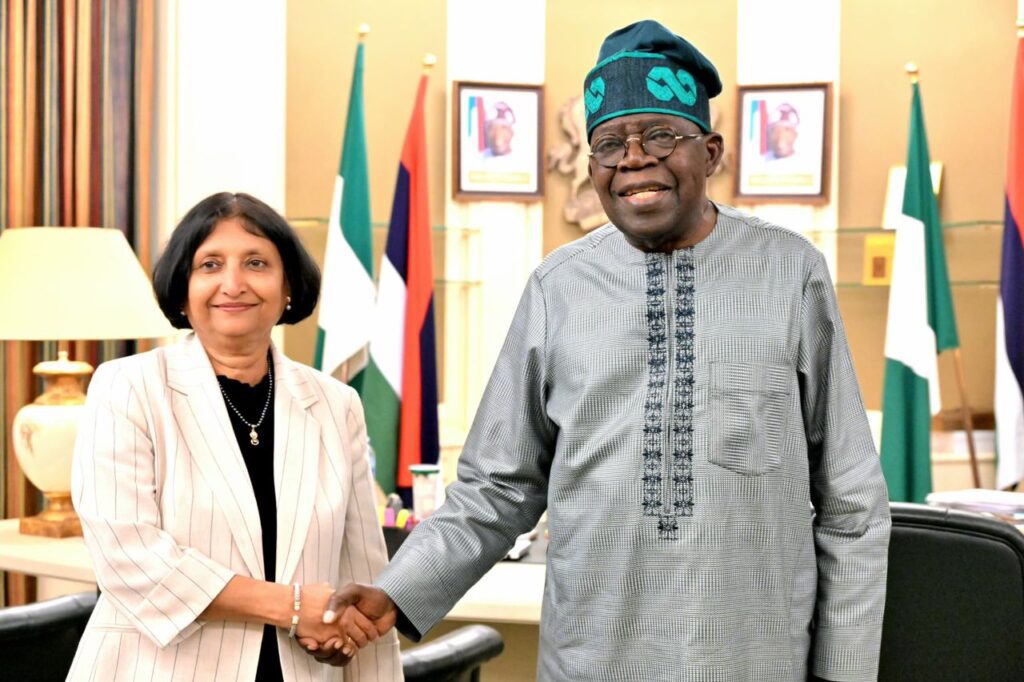The World Bank Group has thrown its weight behind Nigeria’s ambitious plan to lay a 90,000km national fibre-optic backbone, a mega digital infrastructure project expected to boost broadband access, drive digital transformation and unlock growth across critical sectors.
Speaking at the Aso Rock Presidential Villa on Wednesday, World Bank Managing Director and Chief Financial Officer, Anshula Kant, praised President Bola Tinubu’s macro-economic reforms, describing them as “ambitious” and “already yielding results.”
“We have a very large programme with Nigeria,” Kant told journalists. “One of the biggest forthcoming projects will be in the digital space providing broadband access nationwide. We also have projects in agribusiness, energy, social protection, education, and health.”
The World Bank, which currently runs a $9 billion portfolio in Nigeria covering power, agriculture and social protection, confirmed that it will co-finance the new broadband project with other development partners, injecting at least $500 million into the rollout.
A Backbone for Nigeria’s Digital Future
Nigeria’s Finance Minister and Coordinating Minister of the Economy, Wale Edun, said the project would expand Nigeria’s existing 35,000km fibre network to 125,000km making it one of the largest national fibre backbones globally.
He explained that the massive rollout will be structured as a self-financing special-purpose vehicle (SPV) with majority private-sector funding. The Federal Government will hold a minority stake, while private investors will contribute 51 per cent of the total capital.
Minister of Communications, Innovation and Digital Economy, Bosun Tijani, called the project a “once-and-for-all fix” for the country’s poor internet infrastructure. According to him, the national fibre backbone will reach every geopolitical zone, ring each state, and feed fibre directly into homes, schools, hospitals, and offices.
“You cannot scale agriculture, education, or modern healthcare without good connectivity. There are few investments that can add 1.35 percentage points to GDP for every 10 per cent increase in broadband penetration,” Tijani said.
He revealed that presidential approval secured the green light from the Federal Executive Council (FEC) and that ground-breaking is likely to begin before the end of 2025 once final route maps are published within two months.
The World Bank is helping Nigeria design the SPV to ensure the project remains sustainable and independent of government control. User fees from telecom operators and other stakeholders will repay costs and generate continuous returns, rather than relying on government loans or subsidies.
The project is expected to revolutionise connectivity quality in Africa’s largest economy, where millions still endure patchy, expensive broadband despite growing digital demand.
Kant said the fibre project aligns with the World Bank’s broader mission of eradicating poverty on a livable planet. Beyond broadband, the Bank’s future projects in Nigeria will focus on strengthening agribusiness value chains, scaling renewable energy, and supporting small and medium enterprises (SMEs) with new concessional finance schemes.
She described Nigeria as a “very valuable partner” and congratulated Tinubu’s government for “staying the course on tough reforms” that have included scrapping fuel subsidies, unifying exchange rates, and courting foreign investment.
The World Bank has pledged support for Nigeria’s plan to build a 90,000km national fibre-optic backbone one of the largest in the world
Stay tuned to 9am News Nigeria for more Breaking News, Business News, Sports updates And Entertainment Gists.
















